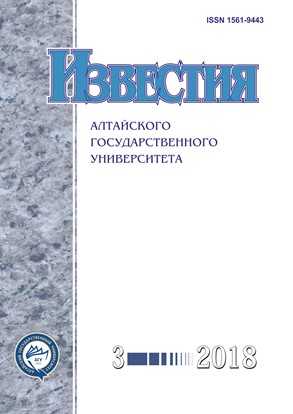Introduction of the Concept of Criminal Misconduct in the Criminal Code of the Russian Federation and the Criminal Procedure Code of the Russian Federation
Abstract
The article describes the main approaches to the definition of the concept of "criminal misconduct", proposed both in the framework of the legislative initiative of the Supreme Court of the Russian Federation and in the framework of Russian and foreign criminal law. One of the key tasks of the legislator is to form in the legal system the rules on responsibility reflecting the nature and degree of public danger of the act, contributing to the restoration of social justice and correction of persons who committed criminal acts with the least force of state coercion. This task of criminal law is performed by the institution of differentiation of criminal liability. To date, the domestic law enforcement agency proposes the development of this institution by introducing the concept of "criminal misconduct" into the criminal code. The authors of the work assess such an approach as positive, within the framework of the General orientation of the reform of the criminal law in the direction of humanization. The paper draws attention to the fact that the institution of criminal misconduct is known in the doctrine of the Soviet criminal law, as well as enshrined in the criminal laws of a number of foreign states. However, the proposed wording of the law is not without drawbacks, which is also noted in the article and some ways are proposed to improve the legislative initiative.
DOI 10.14258/izvasu(2018)3-07
Downloads
Metrics
References
О внесении в Государственную Думу Федерального Собрания Российской Федерации проекта федерального закона «О внесении изменений в Уголовный кодекс Российской Федерации и Уголовно-процессуальный кодекс Российской Федерации в связи с введением понятия уголовного проступка» : Постановление Пленума Верховного Суда РФ от 31.10.2017 № 42 [Электронный ресурс]. — URL: http://www.garant.ru/products/ipo/prime/ doc/71701448/ (дата обращения, 20.05.2018).
Уложение о наказаниях уголовных и исправительных 1845 г. [Электронный ресурс]. — URL: https://lawbook. online/istoriya-prava/ulojenie-nakazaniyah-ugolovnyih-ispravitelnyih-28082.html (дата обращения 20.05.2018).
Уголовное Уложение от 22 марта 1903 г., 1922 г. [Электронный ресурс]. — URL: https://www.twirpx.com/ file/234494/
Устав о наказаниях, назначаемых мировыми судьями: издание 1885 г. : с дополнениями по продолжению 1895 г., с приложением мотивов и извлечений из решений кассационных департаментов Сената [Электронный ресурс]. — URL: https://search.rsl.ru/ru/record/01008085195, (дата обращения 20.05.2018).
Уголовный закон: опыт теоретического моделирования. — М., 1987.
Основы уголовного законодательства Союза ССР и республик от 02.06.1991 № 2281-I [Электронный ресурс]. — URL: http://pravo.gov.ru/proxy/ips/?docbo dy=&nd=102011947&rdk=&backlink=1, (дата обращения 20.05.2018).
Уголовный кодекс Латвийской Республики, принятый Сеймом 17.06.1998 и обнародованный Президентом государства 08.07.1998. LV, 08.07.98, № 199/200 [Электронный ресурс]. — URL: http://www.pravo.lv/likumi/07_ uz.html (дата обращения 20.05.2018).
Уголовный кодекс Литовской Республики, утвержден 26.09.2000 законом № VIII-1968 [Электронный ресурс]. — URL: http://www.kniga.com/books/preview_txt.asp?sku=ebooks351542 , (дата обращения 20.05.2018).
Уголовный кодекс Эстонской Республики от 07.05.1992. RT I, 2001, 73, 452 [Электронный ресурс]. — URL: https://www.twirpx.com/file/239230/ (дата обращения 20.05.2018).
Уголовный кодекс Республики Казахстан от 03.07.2014 № 226-V [Электронный ресурс]. — URL: //http://online.zakon.kz/m/Document/?doc_id=31575252 (дата обращения 20.05.2018).
Уголовный процессуальный кодекс Украины от 13.04.2012 № 4651-VI [Электронный ресурс]. — URL: http://online.zakon.kz/Document/?doc_id=31197178 (дата обращения 20.05. 2018 ).
Пояснительная записка к проекту федерального закона «О внесении изменений в Уголовный кодекс Российской Федерации и Уголовно-процессуальный кодекс Российской Федерации в связи с введением понятия уголовного проступка» от 31.10.2017 [Электронный ресурс]. — URL: http://supcourt.ru/documents/own/24308/ (дата обращения 20.05. 2018).
Уголовный кодекс РСФСР от 27.10.1960 [Электронный ресурс]. — URL: http://www.consultant.ru/ document/cons_doc_LAW_2950/ (дата обращения 20.05. 2018).
Copyright (c) 2018 С.В. Землюков, А.А. Коренная

This work is licensed under a Creative Commons Attribution 4.0 International License.
Izvestiya of Altai State University is a golden publisher, as we allow self-archiving, but most importantly we are fully transparent about your rights.
Authors may present and discuss their findings ahead of publication: at biological or scientific conferences, on preprint servers, in public databases, and in blogs, wikis, tweets, and other informal communication channels.
Izvestiya of Altai State University allows authors to deposit manuscripts (currently under review or those for intended submission to Izvestiya of Altai State University) in non-commercial, pre-print servers such as ArXiv.
Authors who publish with this journal agree to the following terms:
- Authors retain copyright and grant the journal right of first publication with the work simultaneously licensed under a Creative Commons Attribution License (CC BY 4.0) that allows others to share the work with an acknowledgement of the work's authorship and initial publication in this journal.
- Authors are able to enter into separate, additional contractual arrangements for the non-exclusive distribution of the journal's published version of the work (e.g., post it to an institutional repository or publish it in a book), with an acknowledgement of its initial publication in this journal.
- Authors are permitted and encouraged to post their work online (e.g., in institutional repositories or on their website) prior to and during the submission process, as it can lead to productive exchanges, as well as earlier and greater citation of published work (See The Effect of Open Access).








